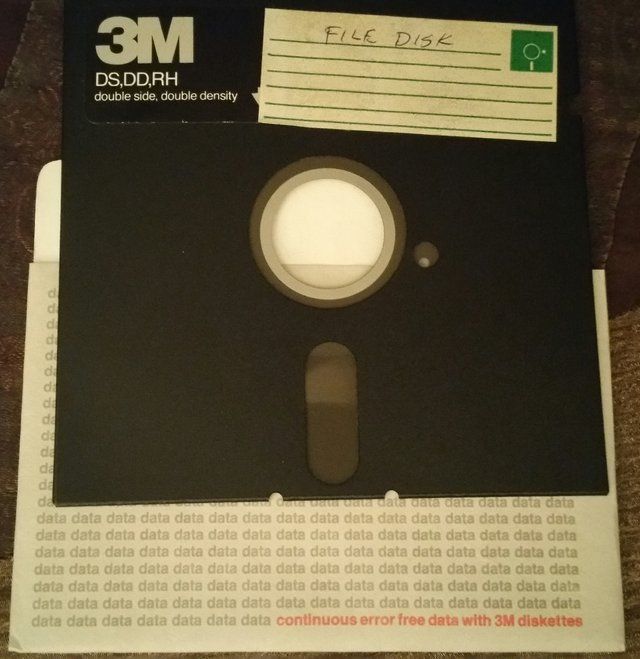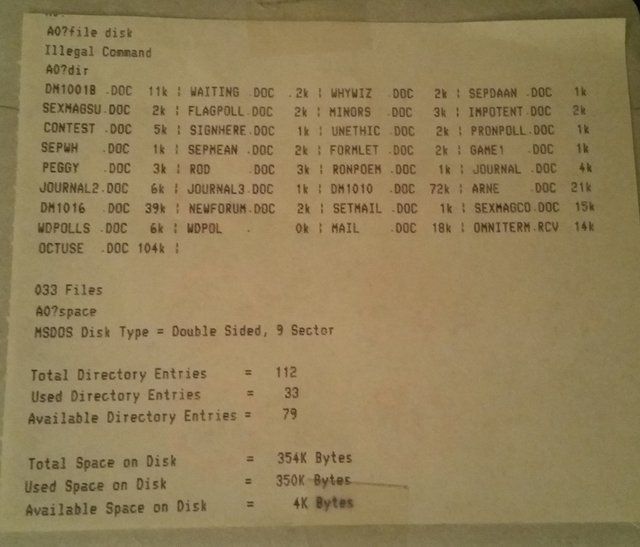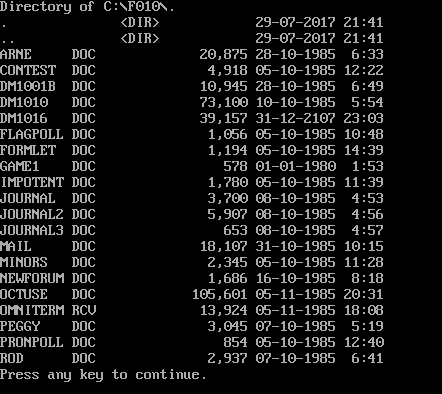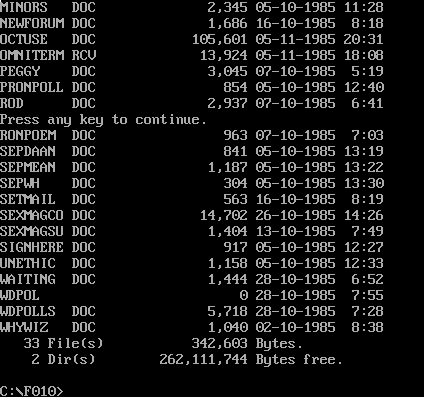

A summary for those that haven't been keeping up with this series:
I found a bunch of 5.25" disks at a thrift store a number of years ago. I finally got around to acquiring a 5.25" disk drive and extracting the contents a while back. Since then I have been posting the contents here.
Based on the contents, at least some of these disks were apparently once owned by someone named Connie A. Buys who used to run the “Close Encounters” Special Interest Group (SIG) on Delphi in the mid 1980s.
A specific definition of this SIG was found in a previous document on one of the disks: “This SIG, known as “Close Encounters”, is a forum for the discussion of relationships that develop via computer services like the Source, CompuServe, and Delphi. Our primary emphasis is on the sexual aspects of those relationships.”
Everything was text based from whatever terminal program you used to dial in to Delphi’s servers. Many of these disks have forum messages, e-mails and chat session logs. All of this is pre-internet stuff and I don’t know if there are any archives in existence today of what was on Delphi in the 1980s. In any case, much of this stuff would have been private at the time and some of it is quite personal.


I've been splitting up the contents of this disk (descriptively labeled “File Disk”) since it contains a number of documents, some of which are pretty long. A 5.25" floppy disk can still hold an impressive amount of info when it is just text. (see the previous parts here: 1, 2, 3, 4, 5, 6, 7).
The contents of this post includes the contents of three documents and is a repost of an article titled "Computer Assisted Resources: Sexuality Education Via Microcomputers" by Ron Mazur and is originally from the Spring/Summer 1985 issue of Journal of Sex Education and Therapy.
===
JOURNAL.DOC
===
Computer Assisted Resources: Sexuality Education Via Microcomputers
By Ron Mazur
(Reprinted from the Spring/Summer 1985 issue of Journal of Sex
Education and Therapy with the permission of Ron Mazur)
The call for participation in the 9th annual 'Symposium on Computer
Applications in Medical Care' (November, 1985), contained 275
"keywords" to classify submissions of paper/programs. Nowhere,
between 1, Accounting/Billing and #275 Veterinary Medicine, could one
find any classification directly related to sex or sexology. Keyword
#167, Mixed Anual Practice did, however, have intriguing
possibilities. So much for computerized medical sex.
Electronic sexuality education does, however, come alive on bright
monitors in thousands of homes and offices. It flourishes in at least
four different categories. The first is in programmed games people
can play. Software such as "Limmericks Unlimited," "Softporn
Adventure," and "Strip Dice," are examples of such programs. They are
listed and rated in 'The Dirty Book <TDB)' which is a "Users Guide to
Erotic Software." 'TDB' promotes and reviews microcomputer games for
adults only.
The second category is instruction/self-help programs. This kind of
software is as yet very limited, but a potential market exists. One
ambitious self-help program already available is 'Treating Sexual
Problems: Program 1 - Erection Problems', created and designed by
Robert Reitman, PH.D., prominent sex educator and therapist. This
program, using principles of cognitive-behavior therapy and computer
assisted instruction, can be experienced in the privacy of the home at
whatever pace is comfortable for the 'client.'
The third category of computer sexuality education is online - people
communicating via the medium of the micro with a modem. This
technology is known as telecommunications. This type of interaction
involves various degress of spontaneity and structure. It can be as
simple as people flirting with each other anonymously through
telephone Bulletin Boards. There are hundres of them operated by
individuals out of their homes. Even 'Playboy' has discovered the
erotic potential of telecommunications, and celebrates this most
personal use of the 'personal computer.'
For a $65 registration fee and $11 per hour, one can also subscribe to
an online service called 'Sextex,' which describes itself as the
"nation's first erotic online service [and] very discrete." This is a
high-tech method of sending one's fantasies into the light of
electrons which return with dancing energy to keep the fantasy
vibrant. College students are discovering how to do the same thing
more cheaply by using their university mainframes for erotic
conferences. Eagerness to get an online account with the university
computer may not always reflect an eagerness for academic research
projects.
The fourth category of electronic sexuality education is also online
and utilizes commercial "information utilites" such as CompuServe, The
Source, Delphi and Newsnet. On CompuServe, for example, there is a
very popular "Human Sexuality" feature operated by medical writers
Howard and Martha Lewis. On NewsNet there is an electronic edition of
"the newsletter for professionals," 'Sexuality Today', edited so
professionally by Suzanne Prescod. Of course even on such information
utilities, subscribers found countless ways within Special Interest
Groups [SIGS] to communicate sexual interests, fantasies, and
concerns. The medium is a nature for people-sharing because of its
interactive dynamics. It is amazing what can be expressed with a
little blinking rectangle on the monitor screen called a "cursor"
(because it runs across the screen).
===
JOURNAL2.DOC
===
On October 8, 1984, the information utility, Delphi, offered to the
public the first online service produced by a Board Certified
Sexologist: 'American Sexology [AmSex].'
A young business with fresh ideas and creative approaches to human
services, Delphi launched my concept of AMSEX as a SIG with a network
of services and newsletters. Originally I had planned to begin only
with an electronic newsletter, but all at once I became a SIG operator
[SIGOP]. This entails not only the management of newsletters, but
also the operation of conferencing, bulletin boards, mail, polls,
personal consulting, and other special features. I am still learning,
with the patient assistance of Delphi and other SIGOPS, the skills and
techniques necessary to become an efficient and creative SIGOP. It is
a major goal of my life, and I am committed to the long-term
development of AMSEX on Delphi.
Currently there are 23 SIGS online, involving the efforts of 37
SIGOPS. Delphi SIG names generaly indicate their purpose or subject
area, e.g., BUSINESS, MEDICAL, GAMES, SPACE RESEARCH, HEALTHNET,
THEOLOGICAL FORUM, FRIENDSHIP CIRCLE. It is always exciting to
discover that a new SIG has been put online because it enriches
Delphi's usefulness to its subscribers.
...
===
JOURNAL3.DOC
===
Resources used by Ron Mazur in his article "Computer Assisted
Resources: Sexuality Education Via Microcomputers":
'The Dirty Book', Computer Products International, 3225 Danny
Park, New Orleans, LA 70002, Vol. 2, No. 2, $9.95.PSYCOMP: Self-Help Software (IBM PC w/64K & Compatibles), P.O.
Box 994, Woodland Hills, Ca. 91367, $89.95.Carr, Richard E., "Type Dirty To Me," 'Playboy', March, 1985.
SEXTEX, High Society Magazine, Cyconline, 801 Second Ave., N.Y.,
N.Y., 10017.'Sexuality Today,' Atcom Publishing, 2315 Broadway, N.Y., N.Y.,
Delphi, General Videotex Corp., 3 Blackstone St., Cambridge, Ma.